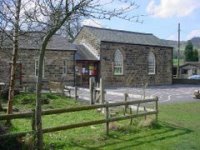We issued the following press release at 15:00 today.
SUPPORTERS LAUNCH SECOND STAGE OF SCHOOL CAMPAIGNCombs, Derbyshire: At a meeting held in Matlock today, Derbyshire County Council’s Cabinet voted to accept a recommendation from education officers to keep Combs Infant School open.
The school had been threatened with closure by the Council as part of their search for a solution to their problem of surplus places in other High Peak schools. Derbyshire County Council decided that closing Combs Infant School would not improve educational standards in the area, and would therefore cause them to fail in their statutory duty.
.JPG)
Following the meeting, the ‘Save Combs School’ campaigners announced that their campaign would immediately move into a second stage, which aims to provide long term stability for the school.
Decision WelcomedHead Teacher, Avis Curry, welcomed the news: “This is such a relief. Everyone connected with the school and campaign has felt under a great strain for months.”
Under Mrs. Curry’s leadership, the school achieved an ‘outstanding’ rating in every category examined by Ofsted in September 2006. The school will now be able to continue to provide up to 26 places for Key Stage 1 pupils.
Combs resident Diane Williamson said: “I was driving when I heard the news of the Council’s positive decision, with tears streaming down my face. We can now make sure that our two-year old daughter will get the best possible start to her education.”
“The decision by Derbyshire County Council is very welcome,” said parent governor Nick Boden, “but it’s regrettable that their decision focused only on the educational merits of the school, and didn’t mention other important elements of the case we put to them, such as the value of a small rural school strongly linked to the community surrounding it. We will continue to explain these points to them.”
Second StageThe campaigners announced today that the second stage of their campaign has begun. Chair of Governors, Nye Rowlands, said: “The decision today by Derbyshire County Council is only the conclusion of the first stage. The school simply can’t operate successfully if it’s constantly under imminent threat of being re-proposed for closure.”
Nye Rowlands explained: “We need to move on from this decision, and work with Derbyshire Council to remedy the damage that has been done by their threat to close the school. We will assist them in putting in place the support for the school that will help it regain stability. We want parents to have full confidence that the school is now there for their children to attend in the coming years.”
Community InvolvementCombs School rents their use of schoolrooms in a building that began life as a Wesleyan Chapel in the nineteenth century. The building also serves as the Village Hall, which is the only community resource for Combs.
The building is managed and maintained by the Combs Village Hall Trust. Chair of the Trustees, Mike Evanson, commented: “Following the Council’s decision, we want to move on with exciting new environmental projects that will extend the use of the Village Hall. One good result of this campaign is that it has emphasised the wealth of diverse talent we have in the Combs area. A strong sense of community has been evident throughout this campaign, and people are saying ‘OK, what’s next?’”
Celebrating Success“First things first, though.” said Nye Rowlands, “We need to say ‘thank you’ to everyone who has played a part in bringing the first stage of this campaign to a successful conclusion, and there will be a celebration at 7pm on 9th November at Combs School and Village Hall for everyone who has wanted to see this outcome.”
Full details of the planned celebration will be posted on the campaign’s web site, at
save-combs-school.org.uk
Download a copy of the press release (56Kb Adobe Acrobat PDF format).

.JPG)


.jpg)
